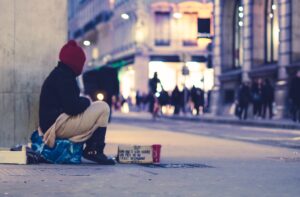Research conducted by Birmingham City University has collected the experiences of homeless people to gather evidence of what life on the streets is really like.
Using first-hand accounts from Birmingham’s rough sleepers, the study found feelings of exclusion and a lack of trust in major institutions means people can stay homeless for longer.
Researchers behind the study were particularly interested in talking to those who have felt vulnerable or criminally exploited or who had seen others experience this situation.
They hope the findings and recommendations made will encourage a change in policy which helps homeless people to avoid a pattern of mistreatment and manipulation.

Dr Mohammed Rahman, a Senior Lecturer in Criminology at Birmingham City University, who led the research, said: ‘While rough sleepers are a minority of the overall homeless population in the UK, they are probably the most visible and certainly the most vulnerable. We felt it important therefore to give them the opportunity to openly and honestly discuss their lived experience.’
The report recommended an increase in multi-agency work between charities and other third sector groups and comprehensive analysis of homelessness data by government.
It also suggested larger-scale investigations into vulnerabilities of the homeless and that academics work more closely with rough sleepers in further studies.
The study found that negative behaviours towards homeless people left them feeling rejected, eroding their trust in the general public and the state, including care services and the police.
Marginalisation and mistrust leads them to turn to each other for comfort and security, forming a strong communal bond between the homeless.
The friendships formed made it more desirable for them to continue sleeping rough, rather than seek housing, despite the violence and exploitation they are at risk of.
However, these bonds, sometimes formed on shared drug or alcohol abuse, could put rough sleepers at risk of mutual dependency and exploitation from criminal gangs.
Researcher Maram Abdulkader added: ‘What we have gleaned from our conversations with rough sleepers is that they are often caught in a vicious cycle of vulnerability and victimisation. Their exclusion from mainstream society contributes to a lack of trust in officialdom, leading them to develop a new sense of belonging among their own community. But this can also limit their mobility and even perpetuate their exploitation.
‘What’s more, feelings of isolation, mistrust of authority and lack of faith in society and its rules results in the homeless often not reporting crimes against them. This is something we have to address.’
In related news, reduced government funding risks undermining homelessness prevention work in the capital, London boroughs have warned amid growing cost-of-living pressures.
Photo by Ev


















Leave a Reply